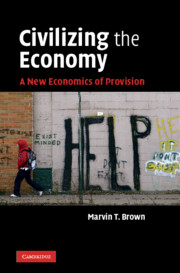Book contents
- Frontmatter
- Contents
- List of figures
- List of tables
- Preface
- 1 Introduction: creating a just and sustainable economy
- Part I Creating a new economic framework
- Part II The civic option
- Part III A civic view of labor, land, and money
- Part IV Civilizing economic systems
- 12 A world of systems
- 13 Imagining a stakeholder economy
- 14 The ethics of economic systems
- 15 Changing systems of provision
- Part V A civic agenda
- Appendix: Free enterprise and the economics of slavery
- Bibliography
- Index
14 - The ethics of economic systems
Published online by Cambridge University Press: 05 June 2012
- Frontmatter
- Contents
- List of figures
- List of tables
- Preface
- 1 Introduction: creating a just and sustainable economy
- Part I Creating a new economic framework
- Part II The civic option
- Part III A civic view of labor, land, and money
- Part IV Civilizing economic systems
- 12 A world of systems
- 13 Imagining a stakeholder economy
- 14 The ethics of economic systems
- 15 Changing systems of provision
- Part V A civic agenda
- Appendix: Free enterprise and the economics of slavery
- Bibliography
- Index
Summary
Once we have included the various organizations and groups that should be represented in the civic conversations of any system of provision, we need to agree on the guidelines for making good decisions, which brings us to the ethics of economic systems.
For our purposes, ethics concerns working through how things “should be.” There are really two basic questions: “What should I (or we) become?” and “What should I (or we) do?” In the organizing of systems of provision, the questions are “we” questions and the answers should represent the best courses of action when different groups have differing views about the right course of action. The ethical analysis of systems usually occurs in conversations where participants disagree and each party thinks they are right. Their conflicts, in other words, are not between right and wrong, but between different versions of what is right. Ethics, in this context, explores the reasons for the different positions and weighs the merits of these reasons by shared values and principles.
Already, in the introductory chapter, we presented justice and sustainability as the two primary aspirations of our global economy and as the basic guidelines for an economics of provision. To use these aspirations in making good decisions, we simply examine different courses of action in terms of whether they bring us closer or take us further away from a just and sustainable economy. In fact, these aspirations have guided many of the arguments in this book.
- Type
- Chapter
- Information
- Civilizing the EconomyA New Economics of Provision, pp. 178 - 192Publisher: Cambridge University PressPrint publication year: 2010
- 1
- Cited by



